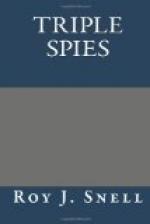“All right.” Johnny smiled as he bowed himself out.
It was the first near-hanging he had ever attended and he hoped it would be the last. But as he came out into the clear afternoon air he drank in three full breaths, then said, slowly:
“Communism! Bah!”
Hardly had he said this than he began to realize that he had a move coming and a speedy one. He was in the real, the original, the only genuine No Man’s Land in the world. He was under the protection of no flag. The only law in force here was the law of the tribe. He had violated that law, defied it. He actually, for the moment, had set himself up as a dictator.
“Gee!” he muttered. “Wish I had time to be their king!”
But he didn’t have time, for in the first place, all the pangs of past homesick days were returning to urge him across the Strait. In the second place the mystery of the Russian and Hanada’s relation to him was calling for that action. And, in the third place, much as he might enjoy being king of the Chukches, he was quite sure he would never be offered that job. There would be reactions from this day’s business. The council of headmen would be called. Johnny would be discussed. He had committed an act of diplomatic indiscretion. He might be asked to leave these shores; and then again an executioner might be appointed for him, and a walrus lance thrust through his back.
Yes, he would move. But first he must see the Jap girl and ask about her plans. It would not do to desert her. Hurrying down the snow path, he came upon her at the entrance to her igloo.
Together they entered, and, sitting cross-legged on the deer skins by the seal oil lamp, they discussed their futures.
The girl made a rather pitiful figure as she sat there in the glow of the yellow light. Much of her splendid “pep” seemed to have oozed away.
As Johnny questioned her, she answered quite frankly. No, she would not attempt to cross the Strait on the ice. It would be quite dangerous, and, beside, she had promised to stay. She did not say the promise had been made to Hanada but Johnny guessed that. Evidently they had thought the Russian might return. She told her American friend that she was afraid that her mission in the far north had met with failure. She would not tell what that mission was, but admitted this much: she had once been very rich, or her family had. Her father had been a merchant living in one of the inland cities of Russia. The war had come and then the revolution. The revolutionists had taken all that her father owned. He had died from worry and exposure, and she had been left alone. Her occupation at present was, well, just what he saw. She shrugged her shoulders and said no more.
Johnny with his natural generosity tried to press his roll of American money upon her. She refused to accept it, but gave him a rare smile. She had money enough for her immediate need and a diamond or two. Perhaps when the Strait opened up she would come by gasoline schooner to America.




